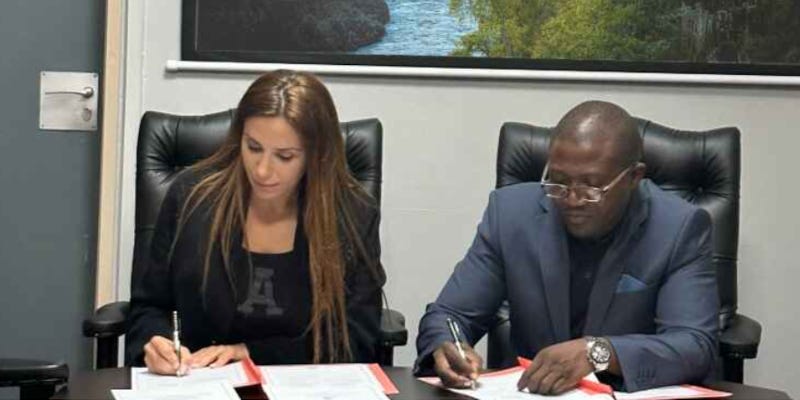Blue Carbon LLC’s green grabbing spree continues with a 7.5 million hectare deal in Zimbabwe
The big REDD fossil fuel distraction game continues.
Blue Carbon LLC, a United Arab Emirates-based carbon company, recently signed a Memorandum of Understanding with the Government of Zimbabwe. The MoU covers forest and land use carbon projects covering an area of 7.5 million hectares.
In addition to Zimbabwe, Blue Carbon has now signed MoUs with Papua New Guinea, Tanzania, Zambia, and Liberia. The MoUs cover a total of 24.5 million hectares.
Which is impressive for a company that was launched less than a year ago, in October 2022.
REDD-Monitor wrote about Blue Carbon in July 2023:
Green grabbing
Blue Carbon’s MoUs are green grabbing on a massive scale. In a 2012 paper, James Fairhead, Melissa Leach, and Ian Scoones define green grabbing as “the appropriation of land and resources for environmental ends”.
In some cases, they write,
environmental green agendas are the core drivers and goals of grabs – whether linked to biodiversity conservation, biocarbon sequestration, biofuels, ecosystem services, ecotourism or ‘offsets’ related to any and all of these. In some cases these involve the wholesale alienation of land, and in others the restructuring of rules and authority in the access, use and management of resources that may have profoundly alienating effects.
In the case of Zimbabwe, the area of land involved covers about 19% of the country’s land area.
Communities included in Blue Carbon’s press release, but absent from any decision-making
According to a press release from Blue Carbon the deal with Zimbabwe is aimed at generating Internationally Transferred Mitigation Outcomes (ITMOs) under Article 6.2 of the Paris Agreement.
Internationally Transferred Mitigation Outcomes is a long way of saying carbon credits.
The press release mentions the words “community” and “communities” seven times - perhaps as a result of the criticism that Blue Carbon received over its proposed carbon deal with Liberia.
Nqobizitha Mangaliso Ndhlovu, Zimbabwe’s Minister of Environment, Climate, Tourism and Hospitality Industry, said in the press release that, “We believe that effective climate action should go hand in hand with community empowerment.”
This was echoed by Josiane Sadaka, Blue Carbon’s CEO, who said that, “Through this collaboration with the Government of Zimbabwe, we are confident that our carbon projects will not only make a positive impact on the environment, but also lead to meaningful improvements in the lives of the people who need it the most.”
And the press release states that,
“Both partners take great pride in the creation of Community Welfare Programs, which will use the funds acquired from carbon credits to boost the advancement of social initiatives concerning the enhancement of healthcare, education, skill development, the establishment of small-scale industries, and more, all aimed at improving the overall quality of life.”
But there was no process of free, prior and informed consent with the communities that will be affected by this massive green grab before the MoU was signed.
There is no explanation of exactly what these Community Welfare Programmes are, or how they will be governed, or what role communities will play in the decisions made by the Programmes.
Neither, of course, is there any mention in the press release that the entire point of generating carbon credits is to allow continued pollution through the extraction and burning of fossil fuels.
The big REDD fossil fuel distraction game
Blue Carbon LLC was created by Sheikh Ahmed Dalmook Al Maktoum. A large part of Sheikh Ahmed’s business involves fossil fuels.
COP28 will be hosted by the petrostate of the United Arab Emirates. The president of COP28, Sultan Al-Jaber is also chief executive of the Abu Dhabi National Oil Company (ADNOC).
Blue Carbon’s climate deals are just a distraction away from the United Arab Emirates’ continued expansion of its fossil fuel industry.
No doubt Blue Carbon’s deals will help UEA push fossil-friendly policies at COP28, or at least avoid any policies that might threaten the fossil fuel industry. (Given that the UNFCCC negotiations have been running for more than 30 years without raising a finger against the fossil fuel industry, let’s face it, UEA doesn’t really have much to worry about anyway.)
And the big REDD fossil fuel distraction game is one that governments have played repeatedly since REDD was first dreamed up.







Free, prior, and informed consent (FPIC)
It's time to have a look at the definitions.
The first three words are all modifiers, individually, of “consent.”
Free: Consent, freely given. Not coerced or manipulated. Too often around the world, Indigenous peoples are "co-opted" by governments or businesses to become "partners" in a project to ensure their consent. They are promised part ownership and/or part revenue. But since business and governments have been holding back Indigenous Peoples in poverty for years, this promise amounts to a bribe and thus not truly free consent. Free consent also cannot be the result of constant prodding, intimidation or boiler-room tactics; it must be very nearly initiated on request.
Prior consent means consent before any project is initiated. This means full consent, not just getting to “yes.” In normal municipal zoning hearings, there is a vastly different level of meaning between a “yes” for a proposed project and a “no.” “Yes” is always final; “no” always means “maybe later,” never an absolute ”not ever.”
However, for environmental projects involving Indigenous Peoples, there must always be a possibility of “no,” as in ‘this is the end of this project’, after a period of time when the peoples see the actual extent of the damage being done to their home lands, or the pathetic dribble of funds coming in. Especially if they have been co-opted with the lure of cash now which alleviates poverty and after a while see the long-term damage being done by this neo-colonialism.
Informed consent should include reading a number of past issues of REDD-Monitor to show them the extent of this charade, the meaninglessness of offsets and the world-wide extent of this manipulative marketing scheme.